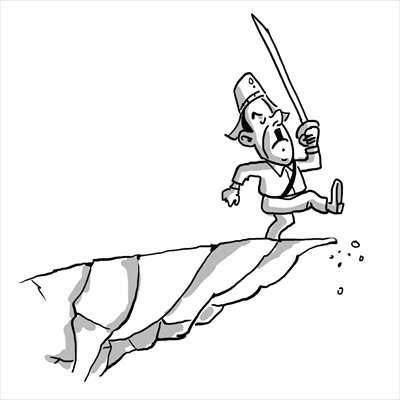Sales of tank engines demonstrate Tokyo eager to drop pacifist stance

Illustration: Liu Rui/GT
Japan has planned a development project involving defense technology cooperation with Turkey, marking another milestone for bilateral ties. The project included a joint venture between Mitsubishi Heavy Industries Ltd and a Turkish corporation to produce engines for tanks.
Tokyo is gradually abandoning the pacifist policy it has followed since WWII. This can be clearly seen in the Abe administration's violations of the "three principles" on arms exports that were drawn up in 1967.
In the past, even the export of helmets was questioned, as they were regarded as tools of war. And Japanese police once conducted investigations into companies that exported small remote-control helicopters to China, since they contended that such crop-dusting helicopters were likely to be transformed for military use.
Nonetheless, today the Japanese government is urging corporations to set up joint ventures with their Turkish counterparts and manufacture engines for use in tanks.
Despite the country's advanced economic development and powerful comprehensive national strength, including the sectors of science and technology as well as its manufacturing industry, Tokyo has been restrained by Washington in its diplomacy. There have been voices in Japan demanding independent diplomacy.
Although technically, the Japanese Self-Defense Forces are not a real army, their equipment and fighting capacity rank among the first throughout the world. While the Japanese talk about and exaggerate the "China threat" theory on various occasions, in private they mock Beijing's weak air and naval power as being unable to rival their own forces.
Boasting of its enormous military potential, Japan needs to find sufficient excuses to break free of its pacifist past, and thereby turn its military potential into military might.
The Abe administration's recent discussion with Turkey on defense technology cooperation came at a very subtle moment, demonstrating that Japan's goals are not that simple.
In early May, Japanese Prime Minister Shinzo Abe made his last stop in Turkey's capital city Ankara during his trip to three Middle East nations. A Japanese source revealed that it was because Turkey showed interest in the advanced transmissions used in engines in Japan's Type 10 Battle Tanks that Abe initiated the bilateral collaboration in developing tank engines.
However, the prime minister did not make promises to his Turkish counterpart immediately, since he understood that Japan was unlikely to launch military technology cooperation with other states due to the restraints of the "three principles" on arms exports.
The administration of former prime minister Yoshihiko Noda relaxed the "three principles" in 2011, allowing for exports that were limited to use in peacekeeping operations and international cooperation or in cases of international joint development and production.
Selling the engine technology for tanks will help neither world peace nor Japan's own security, and therefore should be prohibited even after the "three principles" were loosened to a certain degree.
The sales will, nevertheless, generate incredibly huge benefits for Tokyo.
Weapons exports would be conducive to boosting Japan's manufacturing industry, and consequently stimulating economic growth.
What's more, the Japanese Ministry of Defense has decided to reduce the number of tanks from the current 740 to 300, making it necessary to seek tank technology exports with the purpose of maintaining the development of its military industry.
Japan might consider totally casting away the "three principles" via these actions.
As a member state of the NATO, Turkey has recently been warned repeatedly by the US and some European countries about its decision to purchase a missile defense system with a Chinese firm.
Tokyo's choice of Turkey as the first step to break free from the bondage of the arms export-related principles at such a critical moment may cause the White House to respond with gratitude. This prompted Abe to fly to Ankara for the second time in October to finalize the deal.
Cooperation between Japan and Turkey in developing engines for tanks is just the beginning and more countries will become targets of Tokyo as arms export destinations.
Japan's "three principles" on arms export will one day cease to exist in both name and substance, and pacifism will become an even greater rarity in Japan.
The author is a former bureau chief with the Guangming Daily stationed in Tokyo, and currently head of the newspaper's international desk. opinion@globaltimes.com.cn